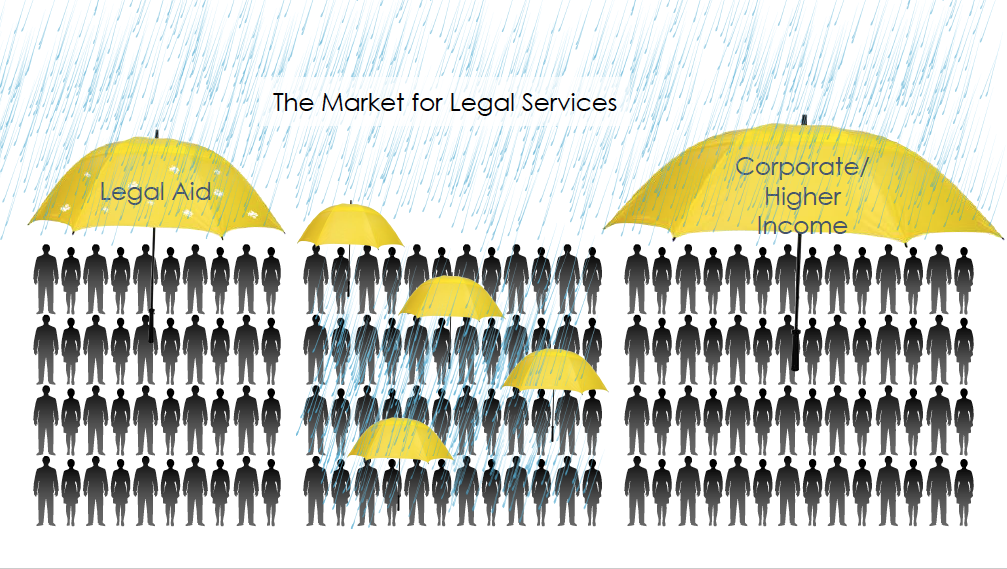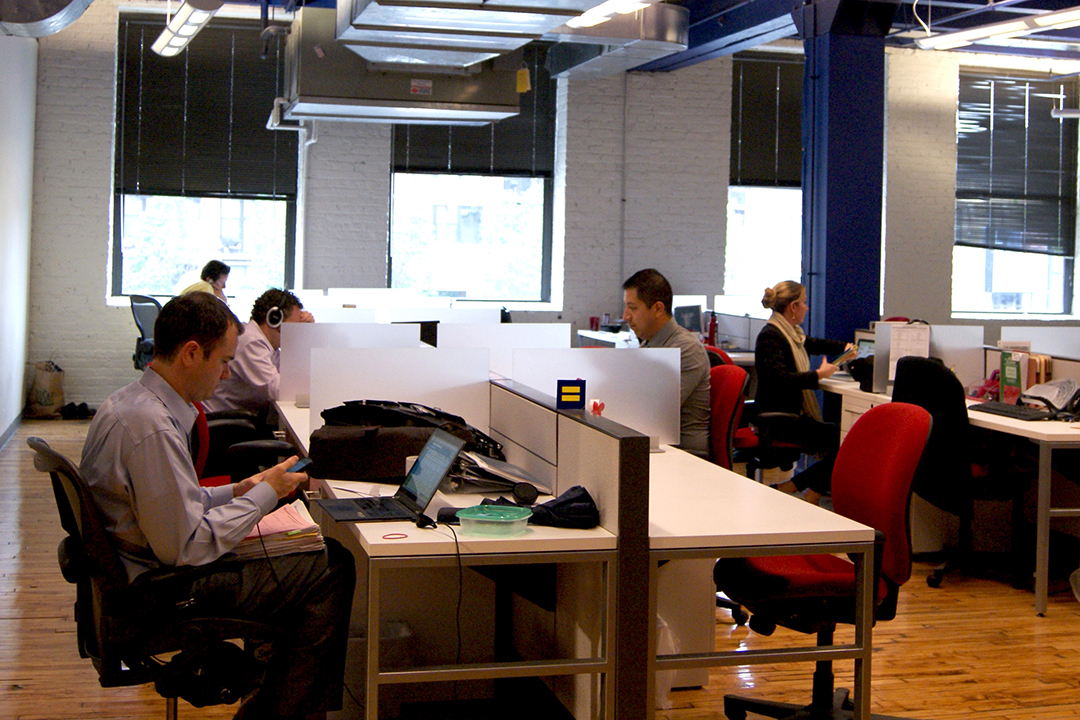Summary
Thousands of Illinoisans every week encounter legal problems that can have a huge impact on their health, stability, and economic wellbeing. Many can afford to pay something for legal assistance but too often are not getting necessary legal help from lawyers due to a failure in the market for legal services for middle-income individuals and small businesses. In 2011, The Chicago Bar Foundation (CBF)1 recognized this broken market and developed an innovative solution to address it by tapping into a growing number of talented and entrepreneurial lawyers interested in socially conscious careers in law: the Justice Entrepreneurs Project (JEP). A small business incubator that fosters innovation in an inherently conservative field, the JEP brings principles of entrepreneurship and experimentation common in the tech startup community to the problem of access to legal services.
To date, the JEP has helped more than 50 attorneys build sustainable businesses serving this market. In 2017 alone, JEP attorneys helped more than 4,000 low- to middle-income clients and brought in more than $4 million in revenue in the process. In addition to the direct impact of that work, the CBF is identifying successful and replicable practice models and helping to spread these innovations to the broader legal market. Dozens of organizations across the country and beyond already have adopted the JEP model or leveraged JEP resources to improve access to legal services in their own communities.
The Market Failure for Legal Services
The proposition that we all stand equal before the law and will get a fair shake in the justice system regardless of our income or circumstances is one of America’s most fundamental principles, reflected in our nation’s promise of “justice for all” that Americans regularly recite at the end of the Pledge of Allegiance. Yet, when people lack meaningful access to legal assistance, that promise can be illusory.
Thousands of Illinoisans will face a legal problem in any given week. Their legal problems may involve family, housing, consumer, immigration, criminal, or other “bread and butter” legal issues that can have a serious impact on their health, safety, independence, and economic wellbeing. Whether they have access to good legal help can make all the difference in what happens to them next. Small businesses and startups regularly encounter legal issues at the early stage of their life cycle that can carry similar consequences for their future success.

"The legal market in Cool County represented by umbrellas in a rain storm. The rain represents legal problems people regularly face, while the umbrellas access to legal help. The people are divided into poor/low-income, middle income, and corporate/upper- income, and as noted in the graphic, the corporate/upper-income group is the only one that regularly has access to necessary legal help today."
The umbrellas in the visual included with this piece represent the people of Cook County, Illinois, but with modest variations in how many people fall into each of the three groups, this chart could represent the legal market anywhere in the country. The group on the left makes up about a quarter of the population and in theory has access to free legal aid or public defender services (for criminal cases). It is a very leaky umbrella, however, because studies consistently show that more than half of them cannot get help when they need it due to a chronic underinvestment in pro bono and legal aid services.2
The group on the right represents about a third of the population and has a very nice umbrella covering them. They can afford legal help when they need it and have a competitive market of lawyers and law firms there to serve them.
The people in the middle class, who make up the largest share of our population in Illinois, earn too much to qualify for already overstretched free legal aid or public defender services, but generally not enough to afford a lawyer at prevailing market rates. In some instances, this market is functioning well, generally where contingent fees (e.g., personal injury cases) or fixed fees (e.g., real estate closings) are the norm. But for most other legal matters, middle income people do not have the “umbrella” of affordable and accessible legal services available to them.
Perhaps the most startling consequence of this growing gap in the market for legal services is the number of people who are representing themselves in court today; the most recent statistics show that in 74 percent of civil cases, at least one party was unrepresented3 even though other studies show the vast majority would prefer to have a lawyer.4 Yet studies show that people represented by a lawyer are far more likely to get better results, resolve their cases more efficiently, and believe they got a fair outcome.5
This is a classic market failure, and it has huge consequences for people facing legal issues, for our community, and for overall confidence in the justice system.
Enter the JEP
In 2011, The Chicago Bar Foundation (CBF) recognized this market failure was also a significant market opportunity and developed an innovative solution to seize that opportunity by tapping into a growing number of talented and entrepreneurial lawyers interested in socially conscious careers in law: the Justice Entrepreneurs Project (JEP). The JEP brings principles of entrepreneurship and experimentation common in the tech startup community to the problem of access to legal services.
The focus of the JEP is on making legal services more affordable and accessible to low- and middle-income people by helping participating lawyers to develop innovative market-based law practice models that enable them to build sustainable small businesses serving this untapped market.

One of the defining features of the JEP is its open, loft-style space. The space is modeled after business and tech incubators rather than traditional law offices and is designed to promote collaboration and innovation.
Photo Credit: Meredith Mazzuca at The Chicago Bar Foundation.
The JEP provides training, resources, mentoring, and support to the participating lawyers in a collaborative office setting. Core tenets of the JEP’s robust 18-month program include setting predictable prices rather than using the traditional billable hour, offering a la carte services, and leveraging technology to create efficiencies.
The CBF is able to leverage significant pro bono and in-kind donations valued at hundreds of thousands of dollars per year to provide cutting-edge training and resources to participants. Dozens of successful alumni of the program remain part of the JEP network and now assist with training and mentoring as well.
The JEP Niche
Historically, the CBF and most other funders of access to justice initiatives have focused their funding and resources on nonprofit legal aid programs serving low-income and disadvantaged people rather than on the broader private market for legal services.
Support for pro bono and legal aid services remains critical and will continue as a central focus, as low-income and disadvantaged people are particularly vulnerable in the legal system when they do not have access to legal help.
However, that work will never be successful if large swaths of the middle-class lack access to affordable legal help. Our justice system depends on everyone having equal access, and programs like the JEP that are developing innovative and replicable market-based models to serve this middle market will play an integral role in the broader solution.
An Exponential Impact
The CBF evaluates the JEP’s success against the three central goals of the JEP Strategic Plan:
(1) Helping the participating lawyers create successful and sustainable law practices targeted towards this market; (2) Helping more low- and moderate-income people get access to affordable legal help; and (3) Identifying successful innovations and creating replicable models that the legal profession can more broadly adopt here in Illinois and beyond.
The JEP already is showing real impact in all three areas. To date, the JEP has helped more than 50 attorneys build sustainable businesses serving this market. In 2017 alone, JEP attorneys helped more than 4,000 low- to middle-income clients and brought in more than $4 million in revenue in the process. In addition to the direct impact of that work, the CBF is identifying successful and replicable practice models and helping to spread these innovations to the broader legal market.6 Dozens of organizations across the country and beyond already have adopted the JEP model or leveraged JEP resources to improve access to much-needed legal services in their own communities, and the American Bar Association recognized the CBF and JEP as exemplary models.7
Much Greater Potential in the Future
Given the proven success of the JEP and the important niche it is serving in the broader access to justice picture, the CBF is committed to continuing to support the program for the long haul. The MacArthur Foundation and the Coleman Foundation already have recognized the potential of the JEP and partnered with the CBF, along with dozens of companies, law firms, and organizations providing pro bono and in-kind support.
However, unlike many other business and technology incubators that can attract outside funding based on a potentially significant return on investment from the startup businesses, more traditional sources of capital are an unlikely source for small law firms geared towards serving this middle market. Successful lawyers in the JEP are proving they can make a good income, but to provide affordable services to this market is never going to bring a large enough financial return to justify traditional outside investment on a large scale.
While new investments in the JEP and similar programs may not yield direct financial returns, the social impact returns are significant. A $250,000 cash investment in the JEP in 2017 created a huge multiplier effect, helping more than 50 lawyers to provide services to more than 4,000 people, and generating more than $4 million in economic activity.
Looking ahead, scaling of the JEP program is most likely to come with replication of its successful practice models and development of similar networks of small law firms around the country. There remains huge potential for socially conscious lawyers to serve this largely untapped market while building successful small businesses, and social innovation will be a critical part of fulfilling our nation’s promise of justice for all.
Author Bio
Bob Glaves is the Executive Director of The Chicago Bar Foundation (CBF), where he is responsible for leading and overseeing the CBF’s work that brings Chicago’s legal community together to improve access to justice for people in need and make the legal system more fair and efficient for everyone. He is a past chair of the Board of Directors for the Donors Forum (n/k/a Forefront) and a past president of the National Conference of Bar Foundations, and has served in several other civic and nonprofit leadership roles.
Works Cited
1 The Chicago Bar Foundation (CBF) is a public foundation based in Chicago that brings the legal community together to improve access to justice for people in need and make the legal system more fair and efficient for everyone. The CBF’s work is made possible by thousands of lawyers and other individual contributors, more than 200 law firm and corporate supporters, and many other dedicated partners.
2 “The Justice Gap: Measuring the Unmet Civil Legal Needs of Low-income Americans,” The Legal Services Corporation, June 2017, www.lsc.gov.
3 “The Landscape of Civil Litigation in State Courts,” National Center for State Courts, accessed April 10, 2018, www.ncsc.org.
4 “Cases Without Counsel: Research on Experiences of Self-Representation in U.S. Family Court,” June 8, 2016, http://iaals.du.edu/honoring-families/publications/cases-without-counsel-research-experiences-self-representation-us; Julie Macfarlane, “The National Self-Represented Litigants Project: Identifying and Meeting the Needs of Self-Represented Litigants, Final Report” May 2013, representingyourselfcanada.files.wordpress.com.
5 “Judicial Council Report to the Legislature: Sargent Shriver Civil Counsel Act,” Judicial Council of California, July 18, 2017, jcc.legistar.com.
6 “Pricing for Access to Justice,” The Chicago Bar Foundation, March 21, 2016, https://chicagobarfoundation.org/news_item/pricing-access-justice/; “New Limited Scope Representation Toolkit a Great Resource for Lawyers to Expand Their Practice and Improve Access to Justice,” The Chicago Bar Foundation, September 13, 2017, chicagobarfoundation.org.
7 “CBF Receives ABA Louis Brown Award for Legal Access,” The Chicago Bar Foundation, February 17, 2018, www.americanbar.org.


